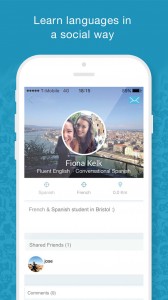
This is a First Look: It’s the first time any news outlet or blog has covered this startup. You can read more First Looks here. (We do this a lot.)
If you truly want to learn a new language, memorizing verb conjugations from a book isn’t going to cut it. Sure, that’s a strategy that could get you to a baseline understanding of a language, but it’s not the grounds for fluency.
The only way you can talk like a native speaker – to learn the idioms, the cadence, the mannerisms – is to sit down with one and converse. But how the heck do you go about finding a madrelingua speaker? Soon, that will be so easy, thanks to a startup coming out of Northeastern called Idyoma.
Forget hiring an expensive tutor to have a simple conversation with you. Idyoma is creating a community of people around the globe who want to meet up with each other and participate in language exchange. And it was all inspired from a study abroad experience in Spain that left co-founder John Lloyd eager to meet and mingle with locals.
Inspiration? Having to make friends
According to Lloyd, he went on his first co-op in Seville, Spain, expecting to have a whole set of friends waiting for him. He was following his girlfriend at the time, who had already been in the European country for a couple of months, so he figured he’d be taking advantage of the contacts she made. Not the case. She broke up with him almost immediately, and he was left to fend for himself in terms of friendship.
 “I had to go out and make my own friends,” Lloyd told me. “Most of the friends I made were other study abroad students and English speakers. But I was really trying to integrate into the Spanish culture. I was at a pretty good level of Spanish at the time, but not enough to get involved in local social groups.”
“I had to go out and make my own friends,” Lloyd told me. “Most of the friends I made were other study abroad students and English speakers. But I was really trying to integrate into the Spanish culture. I was at a pretty good level of Spanish at the time, but not enough to get involved in local social groups.”
Near the end of his co-op, he became friends with Adam Henshall, who had been working in hostels in Seville. Henshall was an English tutor on the side and was having trouble pinpointing potential English-learners. He and Lloyd recognized that, essentially, they were both having the same problem: Bringing together language learners with native speakers for a cultural and linguistic exchange.
“We both found it difficult to meet people around us, more specifically we found it difficult to meet the locals.” Lloyd wrote in an email. “Like any other study abroad student or workaway, we had a general interest in learning the language while we were there, but couldn’t find a means to practice the language.”
Why not just use Duolingo?
Sure, there language schools are a dime a dozen. And tandems – real-life situations where two people would take turns chatting in different languages with one another – are popular in Europe. However, folks usually find them advertised on flyers posted on poles or at schools. There was no effective way to connect people who speak different languages and who want someone to practice conversing with.
Idyoma is hoping to help people who have the basics of language down and who just want to hang out with someone and casually practice speaking. That way, they can increase their conversational proficiency and gain the cultural nuggets and linguistic nuances they can’t find in textbooks.
Lloyd explained where the app fits into the already developed language-learning realm, saying:
I think Idyoma would be perfect to go along with and complement apps like Duolingo and Babble. I don’t think of them as our competitors. They do a great job covering more theoretical learning, kind of like glorified exercise books that teach you vocab and the basics of a language. But after the basics, you need to practice speaking in an authentic setting. There’s more that goes into learning a language like pronunciation and gestures. Reaching fluency can only be attained with real life interactions. Obviously, our first focus is language learning, but we’re also a social app. It’s perfect for people studying abroad or traveling: They can make new friends, discover a city on a deeper level and experience a cultural exchange. Ultimately, it’s a powerful learning tool and it will complement existing platforms and tools.
Idyoma’s first iteration has been live since December, which the team developed using $1,000 of Lloyd’s gift money from his high school graduation and another $1,500 from the co-op scholarship. Those funds got them far enough along to secure gap funding through Northeastern’s IDEA. Since the release it’s the app’s first version, the venture has been primarily focusing on testing it out in Seville. In addition to facilitating one-on-one connections through the app, the startup has also been hosting bi-weekly language events in the Spanish city.

Looking ahead, Idyoma is aiming to land additional capital as it develops its second iteration, which should be coming out in April. With the second release, Idyoma is planning on having more sophisticated user ID verification features (right now it verifies users’ phones), as well as more gamification to engage people and prevent unresponsiveness among users, a common problem with peer-to-peer platforms.
And, it almost goes without saying, but the startup is looking to increase its global presence. Idyoma wants to enable people who are geographically near one another to meet up and chat. So by increasing its reach, the team will be able to help more language-learners to get together and share in an exchange.
Images via John Lloyd.
